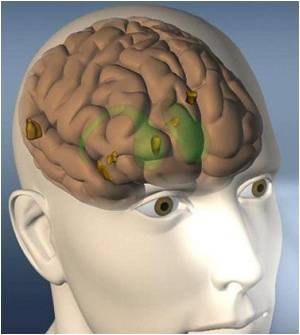Use of brain surgery to treat psychiatric disorders has long been controversial, but new technologies are emerging to help people with severe illness, say scientists.

One new therapy discussed Friday at the annual meeting of the American Association for the Advancement of Science was the use of deep brain stimulation to ease obsessive compulsive disorder, or OCD.
The technique, approved in 2009 by the US Food and Drug Administration for extreme cases under its humanitarian device exemption, involves the insertion of a thin electrode deep in the brain.
The electrical current has been shown to reduce OCD symptoms by about 25 percent in some patients. The technique has been tried on just over 50 people in the United States since the research first began in 2000.
"These techniques are promising but must be used with an abundance of caution," said Benjamin Greenberg, associate professor of psychiatry and human behavior at the Warren Alpert Medical School of Brown University.
"This is reserved for the small proportion of people who are severely disabled and have not benefitted anywhere near adequately from very aggressive use of conventional treatments."
Advertisement
Source-AFP















